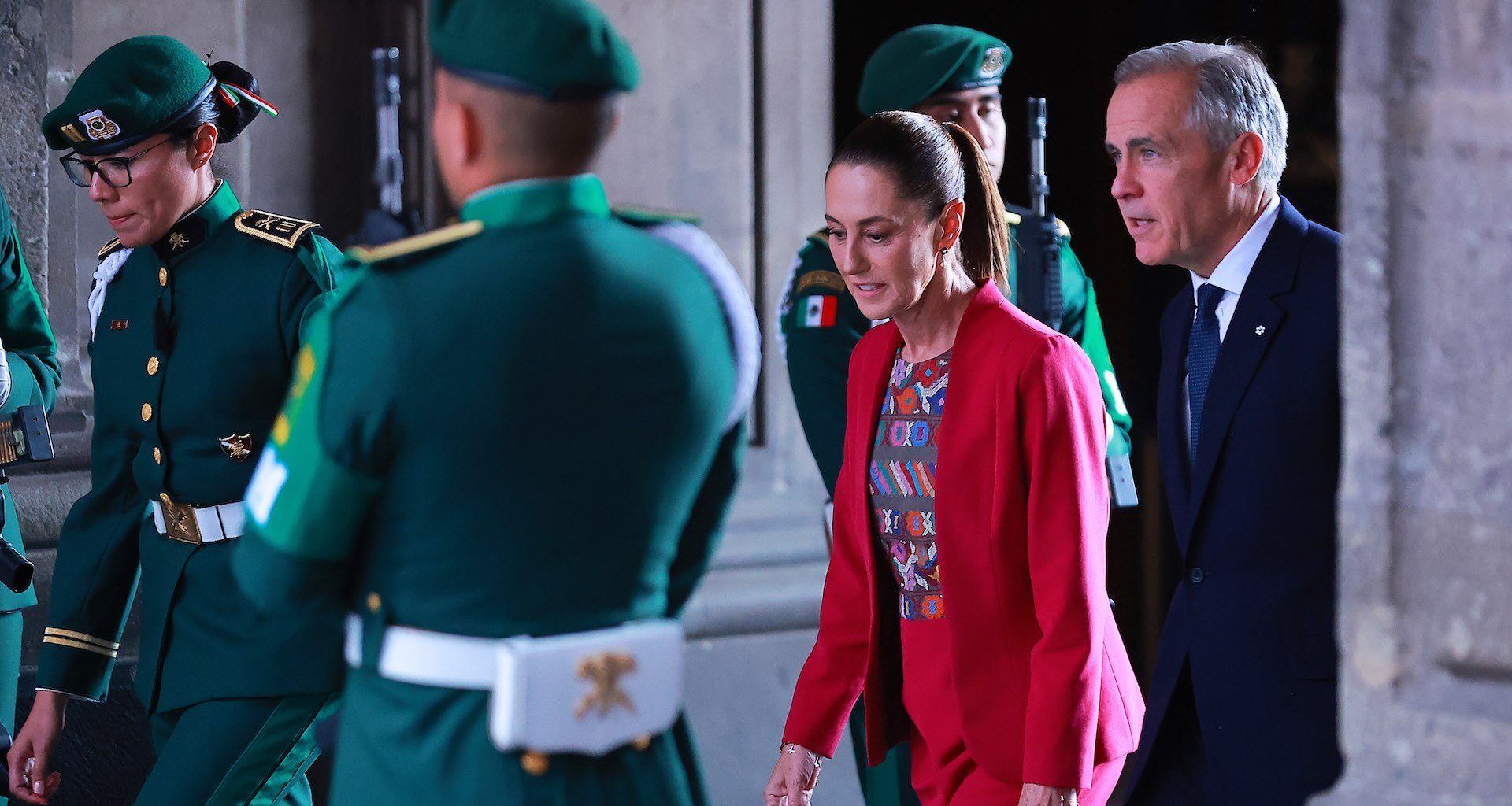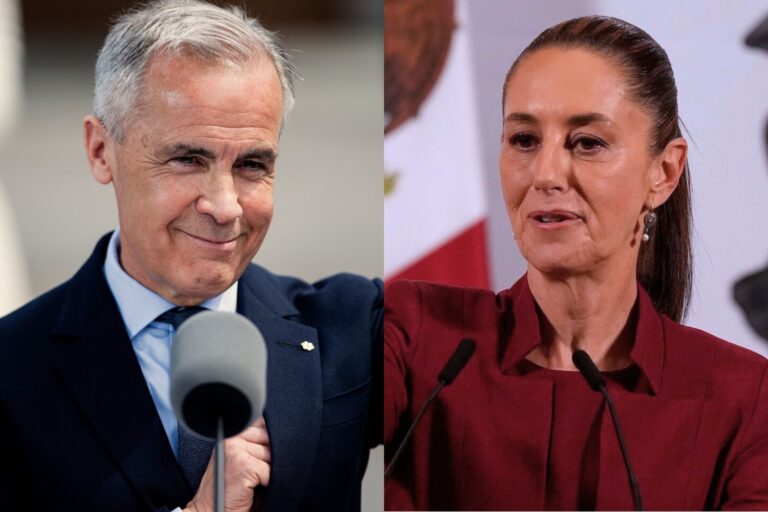MEXICO CITY — Canada and Mexico agreed to better co-operate on everything, from energy corridors and boosting trade in critical minerals to fighting the flow of fentanyl, Prime Minister Mark Carney announced Thursday during a bilateral visit.
A ‘strategic partnership’
Mexican President Claudia Sheinbaum welcomed Carney to the Palacio Nacional on Thursday afternoon, where the two leaders sat down for their second face-to-face meeting this year. Sheinbaum first met Carney at the G7 summit in Kananaskis, Alta., in June.
They launched a new “comprehensive strategic partnership” with an action plan aimed at ramping up co-operation in key areas, including: developing ports, rail, energy corridors; boosting bilateral trade and investment in agriculture, energy, critical minerals and infrastructure; and protecting wildlife and freshwater resources. They will also create a new “bilateral security dialogue” to fight trafficking, transnational organized crime, money laundering and cybercrime.
Canada pledged $5.5 million for a project led by the International Labour Organization to improve job and skills-training programs for migrants and displaced people within Mexico. Carney also committed $4.4 million to support Mexico’s efforts to combat fentanyl—the issue U.S. President Donald Trump named as his reason for slapping broad-based tariffs on both countries at the outset of his trade war.
Fútbol diplomacy
To help things go smoothly as Canada, Mexico and the U.S. co-host the 2026 FIFA World Cup next summer—amid what is expected to be a contentious review of the United States-Mexico-Canada Agreement (USMCA)—Carney named Adam van Koeverden, the secretary of state for sport, as Canada’s “sherpa” for the event. The Prime Minister’s Office said the World Cup is expected to generate about $2 billion for the Canadian economy and create more than 24,000 jobs in Canada.
Intergovernmental Affairs Minister Dominic LeBlanc has been tasked with leading a forthcoming trade mission to Mexico, adding to his growing list of duties. He already held the portfolios for Canada-U.S. trade, as well as for Carney’s push to speed up major infrastructure projects. And that was before he took on responsibility for internal trade on Tuesday. LeBlanc, Foreign Affairs Minister Anita Anand and Rachel Bendayan, the parliamentary secretary to Carney, are all on the trip.
A forever ‘fragile’ relationship
The visit comes nearly a year after Ontario Premier Doug Ford and Alberta Premier Danielle Smith encouraged Ottawa to seek a bilateral trade deal with U.S. President Donald Trump to avoid being caught up in the U.S. view of Mexico as a “back door” for Chinese imports, particularly in the auto sector. Then-finance minister Chrystia Freeland said those concerns were valid—all prompting Sheinbaum to publicly urge Canada not to cut Mexico out of the loop.
Brian Clow, who advised former prime minister Justin Trudeau on Canada-U.S. relations when the USMCA replaced the North American Free Trade Agreement, said in an interview that those remarks were a “mistake.” Still, he expects both countries to look out for their own interests when it comes to Trump—as Clow believes Mexico did in 2018 when it reached a preliminary deal with the U.S. when Canada was not at the table.
“It is fragile and will always be fragile,” he said of the Canada-Mexico relationship. “The work to keep the relationship trusting and constructive never ends.”
Travelling executives
The private sector is ahead of the curve; the Business Council of Canada and Mexican business leaders have been in regular contact as they make the case for the future of USMCA. Several Canadian executives of firms with significant interests in Mexico are in the capital for the visit, where they took part in a roundtable discussion with both leaders and are set to attend a closed-door evening reception.
They include François Poirier, CEO of Calgary-based TC Energy, which has a US$3.9 billion Southeast Gateway natural gas pipeline project in southern Mexico; Scott Thomson, president and CEO of Scotiabank, which has the fourth-largest loan portfolio in Mexico; Nancy Southern, chair and CEO of Calgary-based energy, building and defence company ATCO; Rob Wildeboer, the co-founder and executive chairman at auto parts manufacturer Martinrea; John Baker, CEO and founder of D2L, the education tech company based in Kitchener, Ont., behind online learning platform Brightspace; Keith Creel, president and CEO of Canadian Pacific Kansas City (CPKC), the continent-wide rail network that is upping its direct shipments from Canada to Mexico.
Trade opportunities
Canada sold about $9.4 billion worth of goods to Mexico last year—just over one per cent of its total exports. Michael McAdoo, a partner and director of global trade and investment at Boston Consulting Group, said merchandise trade figures do not capture the full picture, including the tourism sector and the crucial role that Mexican manufacturing plays in the highly integrated North American auto industry. About $57 billion in investment in Mexico last year came from Canada.
Still, Canadian firms should be more “ambitious” in the Mexican market, said McAdoo, a former executive at Bombardier who used to manage a production unit at its aerospace plant in Querétaro, about 215 kilometres northwest of Mexico City. Noting that Canada already has a trade deal with Mexico, he added: “There’s a very big economy that’s growing, that’s younger, that’s on our doorstep.”
Emilio Cadena, chief executive of Prodensa, a firm that helps foreign investors set up and grow manufacturing operations in Mexico, said efforts to boost direct trade are welcome, but can only go so far. “If we don’t have the Americans, who are in the middle, in the conversation, then there isn’t much that we can do,” Cadena said in an interview with The Logic. “Yes, of course, we can send things on a ship directly to Canada, but really, this is not how supply chains work.”
Correction: ATCO is a Calgary-based energy, building and defence company. This story has been updated.

